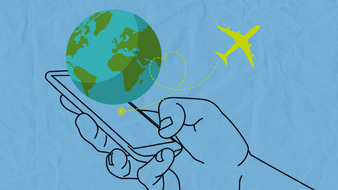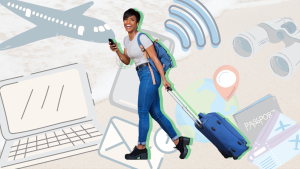When you’re thinking of all the fun things you’ll be doing, you might not be considering how to keep your tech and data safe. Being away from home increases some risks: devices can be lost or stolen, we may fall victim to hackers or scammers or we may not have the connectivity we expect. Before you go, make the most of ITS services using these summer travel tech tips.
Prep your tech
There’s a lot to do before you head out of town and it’s a good idea to incorporate some digital housekeeping into your planning.
Install updates
Make sure software and devices are up to date. Not only does this help close vulnerabilities that hackers may exploit to attack your devices, it may also prevent you from needing an urgent software update when you’re on subpar hotel Wi-Fi or using your mobile data.
Change Password
Will your Onyen password expire while you’re away? If so, it’s a good idea to change it while you’re at home or in the office. Not sure when your password expires? You can check your Onyen status at onyen.unc.edu. If you forget your new password or don’t change it before it expires, self-service password reset is now available 24/7, made possible by Duo 2-Step Verification.
Check 2-Step settings
Traveling internationally? You may not have cell signal to receive text messages or voice calls. Check your 2-Step settings for both Duo and Microsoft 365 to make sure you have ways of authenticating that don’t rely on having cell service. Duo supports a physical security key option, and both 2-Step providers have mobile apps that generate passcodes without cell signal or even Wi-Fi. If possible, enroll an additional device, such as a tablet, to ensure you can authenticate even if your primary device is unavailable.
Download helpful apps
Save important documents
Are you taking advantage of your free access to LastPass Premium? You may know LastPass as a password manager, but it’s so much more. While you’re traveling, the Secure Notes feature is a great way to keep important documents and information safe, even if your device is lost or stolen. LastPass offers both security and convenience; your data is encrypted, accessible from multiple devices and sharable with trusted contacts. Consider it for secure storage of things like a photo of your passport, vaccine card, hotel safe combination or code to the vacation rental.
Take learning to-go
Your to-do list might include downloading a movie for the plane or packing a beach read, but how about incorporating some learning too? Use your free access to LinkedIn Learning, including the LinkedIn Learning app, and find a great new way to engage your brain. LinkedIn Learning offers a variety of courses, many under an hour and topics range from software to soft skills. You can download for offline access and some courses are available in an audio-only format to take your learning to-go.
Connect safely
We rely on internet access for almost everything. While it’s tempting to connect to free Wi-Fi, it can leave your virtual door open for hackers. Criminals use Wi-Fi networks as bait to catch you and your data. They hack into existing ones or even create their own fake networks to set the trap. Once you join, they’re able to see information you transmit, such as your credit card or banking information.
Limit public Wi-Fi
It’s best to assume that unknown public networks, both free and paid, are compromised. The safest option is to refrain from using untrusted Wi-Fi entirely. If you do connect to public Wi-Fi, always check that websites start with https:// instead of http://, limit your activity and don’t access sites that will transmit personal or sensitive information, like banking and shopping.
When using public Wi-Fi, a virtual private network, or VPN, can help shield your data from hackers by encrypting your data so it’s unreadable if intercepted. UNC-Chapel Hill provides a VPN to connect to on-campus and sensitive University resources, such as remote desktop and ConnectCarolina. If you need to configure the UNC VPN, use these instructions. To connect securely to non-University resources and websites, a personal VPN is a good option.
Connect to eduroam
There are safe Wi-Fi networks out there, and one of them is probably already configured on your device: eduroam. UNC-Chapel Hill uses eduroam to deliver on-campus Wi-Fi, but did you know it’s part of a worldwide network? Eduroam, derived from the words “education” and “roaming,” provides 10,000+ hotspots at schools, universities, museums and cultural sites in more than 100 countries. When you register your device with eduroam at Carolina, you will automatically connect to encrypted Wi-Fi whenever you’re in range of eduroam, no sign-in necessary. When your device connects to eduroam, you can trust that it’s secure. Not registered or want to register additional devices? Visit wifi.unc.edu.
Stay productive (or not!)
For better or worse, our digital tools and portable tech keep us connected to work, no matter where we are. You may have mobile productivity apps, like Outlook, Teams or Zoom, on your personal devices. These apps are a great way to respond quickly to emerging issues at work, but they can make it hard to feel like you’re truly off the clock.
Silence Office notifications
Instead of using the nuclear option and deleting your work apps while you’re on vacation, try using Microsoft’s “quiet time” and “do not disturb” in-app features.
For Teams, choose either Quiet Hours or Quiet Days. In the app, tap your profile, choose Notifications from the main menu. Then, configure how and when Teams should disable notifications to your device. You may wish to set a reminder to re-enable notifications when you’re done with your trip.
For Outlook, use Do Not Disturb mode to snooze notifications. In the Outlook app, tap the menu in the upper left, then the alarm clock icon in the upper right. You can choose between either timed, such as by day, or scheduled periods, such as during events. If you choose to disable notifications until you turn it off manually, set a reminder to re-enable when you return.
Relax and enjoy
Your trip is a well-earned time to recharge, but tech disasters can drain your batteries. Following a few steps to stay cybersafe can give you some peace of mind and help you unplug on vacation. For Visit Safe Computing at UNC for additional tips on traveling with technology.














